Iran-Linked Hackers Target World Defense Firms With New Malware

Microsoft says an Iranian cyber espionage group is using a newly developed malware called FalseFont backdoor for intelligence gathering on defense industry companies worldwide.

Microsoft says an Iranian cyber espionage group is using a newly developed malware called FalseFont backdoor for intelligence gathering on defense industry companies worldwide.
“Microsoft has observed the Iranian nation-state actor Peach Sandstorm attempting to deliver a newly developed backdoor named FalseFont to individuals working for organizations in the Defense Industrial Base (DIB) sector,” said Microsoft Threat Intelligence Unit, the firm’s global network of security experts.
Peach Sandstorm, (formerly Holmium), also known as APT33, Elfin, and Refined Kitten, has recently focused on organizations in the US Defense Industrial Base (DIB), which includes hundreds of thousands of American and foreign entities and subcontractors that perform work for the US Department of Defense (DOD) and other Federal departments and agencies.
The first instances of FalseFont in action were detected against targets in early November 2023.According to Microsoft’s investigative team, Peach Sandstorm is actively pursuing intelligence gathering for the Iranian government. Microsoft did not attribute the hacking to any particular Iranian government entity, but the Islamic Revolution Guard Corps (IRGC) is known for its large ‘cyber army’ that engages in both suppression of internet access and cyber surveillance within Iran and disinformation activities abroad, as well as sophisticated hacking of Western and other targets.
The new report follows Microsoft’s earlier findings, outlined in a September 2023 blog post, where Peach Sandstorm was identified as targeting sectors such as satellites and pharmaceuticals on a global scale.
Earlier this year, Microsoft warned that Russia, Iran, and China are likely to plan to influence the upcoming elections in the United States and other countries in 2024. Microsoft's Threat Analysis Center also confirmed that Iran has intensified its cyberattacks and influence operations since 2020.
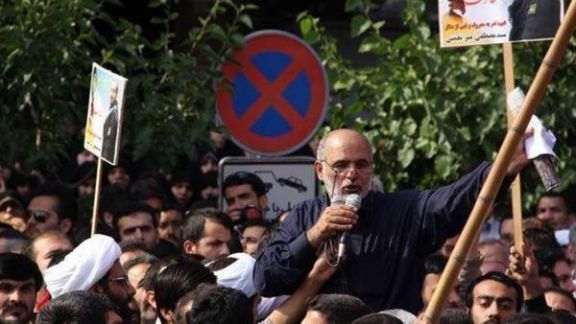
A vigilante leader in Tehran has rebranded himself as a conservative politician and has established his own party to run for the upcoming parliamentary elections.
As the 8-year-long Iran-Iraq war ended in the late 1980s, some of the veterans who returned home, realized that the country has changed while they were in the battlefronts. Their generals got financial concessions from the government, and the cities looked as if there had never been a war, with women defying the compulsory hijab and male and female students mingling at the campuses and elsewhere.
Furthermore, Ayatollah Ruhollah Khomeini’s death almost a year after the war made the situation look even worse for the veterans. Saddam Hussain, the Islamic Republic's arch enemy was now being referred to as Brother Saddam and an ally.
So, the former soldiers organized themselves as Ansar Hezbollah and started to attack the relatively moderate government of President Akbar Hashemi Rafsanjani. Having been indoctrinated during the war with Islamist propaganda, they beat women and university students in the streets of Tehran, Esfahan, Mashhad, and other major Iranian cities.
When the new leader, Ali Khamenei came to power, he used the Ansar on a few occasions to suppress dissent in Tehran and Mashhad, but generally, he did not give them much of a space to be politically active. Hossein Allahkaram, the vigilante group's leader was not happy with the spoils of war he had won, which was the much-sought license for a travel agency that could make anyone rich almost overnight. He wanted to have a say in politics, but everyone looked at the vigilante group as a bunch of reckless thugs.
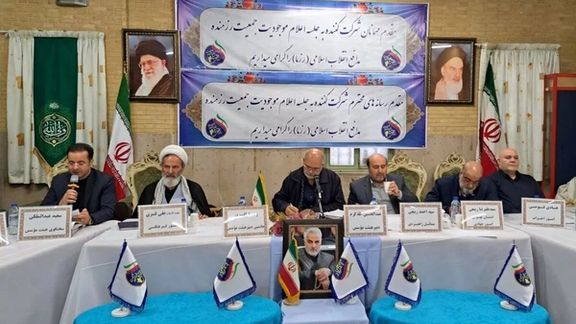
Allahkaram, cleared the streets and went to the university using the government entitlement given to former soldiers. After his graduation, according to Etemad newspaper, he was no longer a man to stand in the streets. Now he wanted to sit at the political bureau of a political party. That was how he officially established The Society of Combatants Defending the Islamic Revolution, aka known as Razma.
The party's platform is one of "eliminating poverty, offering political and cultural insight, explaining the merits of the revolution, preparing cadres for the country, and nominating revolutionary candidates for elections." This, he said, "Is an independent party."
Coming from the lower depths of the Iranian society, and the poor neighborhoods of southern Tehran, Allahkaram, now 67, still travels on a motorbike and lives near a cemetery in southern Tehran. His violent past is almost forgotten, and he can now invest in his credentials as someone from the poor neighborhoods. Until late 1990s, he organized rallies in the affluent northern part of Tehran against capitalism and "hijablessness" and heavy-handedly tackled any barrier to the rallies. The price he paid, was the ban on his group's publications, otherwise he and his group passed the test of time almost without any serious consequence.
The government turned a blind eye on his activities as hardliners benefitted from his street battles with "liberals". However, Allahkaram never assumed any responsibility for the violence his group employed in the streets. His political track record includes his support for government agents murdering Iranian intellectuals in the 1990s and his mild criticism of Iranian thugs who attacked the British embassy in 2011.
Allahkaram may not be in a good position to compete with Iranian hardliners who are now at the center of Iranian politics, and he may not win as many seats in the parliament as he hopes. Other hardliners have turned into dragons and monsters, while Allahkaram and his group fought in Iraq, Bosnia and on the streets.

Amid dire economic conditions, especially for wage-earners, two Iranian workers hanged themselves at the site of the petrochemical plant that had fired them.
Javad Norouzi and Mostafa Abbasi, two workers from the Ilam petrochemical complex in the province’s Chavar (Chovar) district, attempted suicide in protest against their job terminations. They survived thanks to prompt intervention by their coworkers and were taken to the hospital, but their condition is critical.
Workers in petroleum and petrochemical companies in Iran are particularly vulnerable due to their challenging working conditions and low wages. However, suicide by workers in other industries, as well as teachers, has become a prevalent phenomenon in Iran.
Reports indicate that employees at Chavar have to endure harsh working conditions and receive very low wages. This, combined with the worsening economic situation in Iran, has contributed to unbearable livelihood problems, leading over a dozen other workers to end their lives in the past few years.
A notable issue is the absence of an independent trade union organization for the over 1,000 workers at Chavar Petrochemical Company, most of whom are contracted employees. This lack of job security, insurance, and benefits exacerbates their challenges.
The workers of the company have held several rounds of protests, but their appeals to the labor ministry and governorship have not yielded positive outcomes.
Food prices have risen by more than 80 to 100 percent in recent months, on top of high inflation in the past few years, while most wage earners get less than $200 a month.
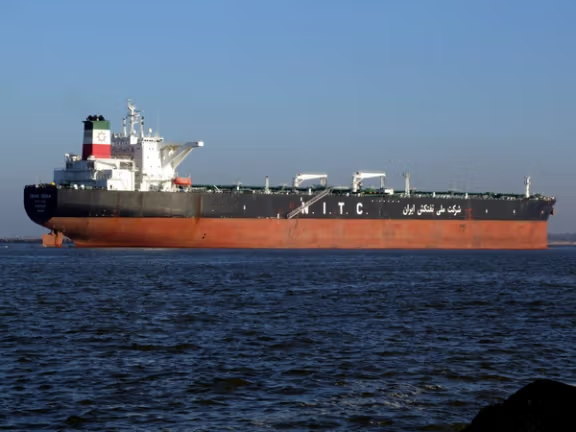
While Iranians suffer from the highest inflation rate in decades, with a record devaluation of rial, a lawmaker claims oil exports reached over 1.5 million barrels per day.
Behrouz Mohebbi Najmabadi, a member of parliament’s budget committee, said that when the current administration took office, the country's daily oil sales were 400,000 barrels. “However, by utilizing the capacities of neighboring and special allied countries, such as the Shanghai Cooperation Organization, BRICS, and regional agreements, today Iran's crude oil sales have exceeded 1.5 million barrels per day."
According to Najmabadi, the previous administration sought to raise the country’s crude exports through lifting the sanctions, but President Ebrahim Raisi's government devised a sanctions-neutralization plan in addition to diplomatic pursuit of removing the sanctions.
He claimed that global developments, particularly Europe’s sanctions on Russia over its invasion of Ukraine, was one of the factors contributing to the rise in Iran’s oil sales.
“Today, Iran is experiencing better economic conditions, and economic growth is a result of these developments,” a claim in stark contrast to the realities of life for Iranians who do not see any progress in solving their economic woes.
Earlier in the week, the CEO of the National Iranian Oil Company announced a 60% growth in the country's oil production over the past two years despite global sanctions. Iran’s oil minister Javad Owji claimed last month that the country is producing 3.4 million barrels per day (mb/d) of crude oil.
Despite full US sanctions on Iranian oil exports imposed in May 2019, China remains the primary buyer. Initially, Iran's shipments dropped significantly to around 300,000 barrels per day. However, following the Biden administration's indirect talks with Tehran to revive the JCPOA nuclear deal, Chinese purchases increased. Some observers suggest that the United States has exercised restraint in cracking down, possibly to avoid jeopardizing the prospects of a nuclear deal.
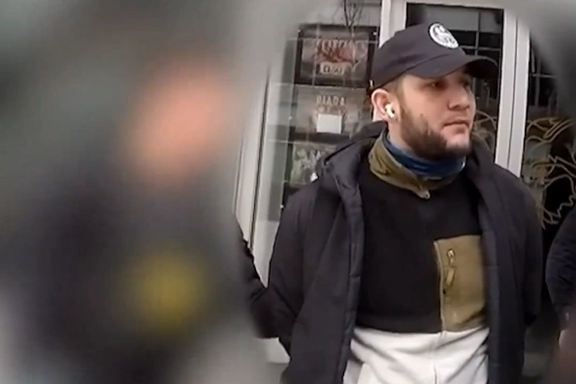
The Central Criminal Court of England sentenced a man arrested for gathering information on Iran International's London headquarters to 3.5 years behind bars.
Originally from Chechnya but residing in Austria, Magomed-Husejn Dovtaev (Mohammad-Hussein Dovtaev) was detained at Chiswick Business Park by officers from London’s Metropolitan Police Counter-Terrorism Command in February. He was charged with a single count of attempting to collect information "likely to be useful to a person committing or preparing an act of terrorism." The jury court returned a guilty verdict for him on Thursday.
Dovtaev is required to serve two-thirds of his sentence of three years and six months. The 10 months he has already spent in custody since his arrest will also be counted as part of his jail term.
“This trial was a reminder of the threats journalists and news organizations face. Journalism is under attack across the world from those who seek to suppress media freedom,” Iran International said in a statement after the verdict was announced. “We will not be cowed by threats. Our journalists will continue to provide the independent, uncensored news the people of Iran deserve,” stated the news and television network, which is the the most viewed foreign-based channel in Iran in the absence of free media in the country.
During the course of the trial, the police also released footage of Dovtaev gathering information about the security arrangements around the office building that housed Iran International and recording videos of the area. The police also released footage of the moment he was arrested.
Prosecutors said Dovtaev covertly filmed material on his phone in order to "identify vulnerabilities" in the media company's security which could be exploited by others.
Dovtaev’s botched operation was only a tip of the iceberg of Islamic Republic’s attempts to silence Iran International. Earlier in the week, UK’s ITV revealed that the IRGC was plotting to assassinate two Iran International television anchors in London in 2022 amid Iranian anti-government protests. Iranian spies offered a people-smuggler $200,000 to target the Iran International site with a car bomb.
Due to the the difficulty of passing the building's security, the initial plan was a car bomb but later was changed to assassination of two anchors while there were discussions of killing several directors of the channel. The plot was foiled because the man hired to do the job turned out to be a ‘double-agent’ working for a western intelligence agency. He would relay all the information to his handler and has now shared some details with ITV. Based on irrefutable evidence – seen and verified by ITV and multiple officials – the plot was commissioned and signed off by Mohammad Reza Ansari, the IRGC commander in charge of assassinations outside Iran. Ansari is the ‘mastermind’ behind failed plots to assassinate former US officials Mike Pompeo and John Bolton – for which he was sanctioned by the US treasury.
In a statement, Reporters Without Borders (RSF) condemned the Islamic Republic's "shocking tactics used by Iran to silence critical voices," calling on the UK government to do everything it can to hold Iran to account and ensure the safety of Iranian journalists.
"Iran will stop at nothing to intimidate journalists, abroad just as at home. It is good news that these particular plots were foiled, but they won’t be the last. The UK government must step up efforts to stop Iran’s brazen attacks and ensure adequate safeguards are in place to protect journalists,” said Fiona O'Brien, the RSF UK Bureau Director.
Prosecutor Nicholas de la Poer told London's Old Bailey that Iran International became a target for reprisals following its reporting on the death in custody of Mahsa Amini in Iran last year and subsequent protests in the country. Iran's minister of intelligence later declared Iran International a terrorist organization, de la Poer said, which meant its employees "became targets for violent reprisals".
In November 2022, Volant Media, the parent company of Iran International, said that two of its journalists had been notified of direct threats. Following the significant escalation in Iranian state-backed threats and advice from the London Metropolitan Police, Iran International TV announced in February that it reluctantly and temporarily closed its London studios and moved broadcasting to Washington DC. After months of hiatus in broadcasting from the UK, the network relaunched operations from a new London building in September.
According to Iran’s Intelligence Minister Esmail Khatib, the Islamic Republic regards Iran International as “a terrorist organization.” He has stated that its staff and anyone affiliated with the channel will be pursued by the Ministry of Intelligence all over the globe, reiterating threats to “punish all those” who had a role in popular protests against the regime, wherever they might be.
Since its inception, the Islamic Republic of Iran, has been engaged in plots against Iranian opposition in exile. Some attempts have been more successful than the others, but the regime has never ceased threatening and targeting those who dare speak against it, even those ostensibly safe in western Europe or the United States.
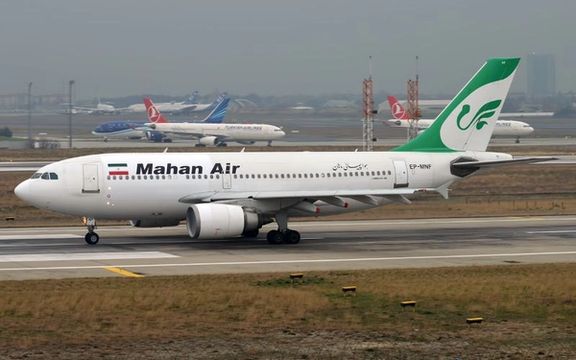
A global conflict tracker has revealed how South Africa helped Iran circumvent the United States’ sanctions on the Islamic Republic’s aviation industry.
Aviation expert and author Babak Taghvaee from the Crisis Watch said on X that Iran’s MahanAir, affiliated with the Revolutionary Guards (IRGC), received two RJ85 passenger aircraft on Thursday.
“The aircraft are purchased by means of a South African and a Congo-based company and were just transferred to Iran by means of a stop in India,"he said, claiming that two more will be delivered Friday. He also shared aerial maps tracking the two aircraft -- TN-AKO and TN-AKP -- before reaching Chabahar port city in southeastern Iran.
According to an agreement between the Islamic Republic of Iran and the Taliban, the RJ85s purchased by Mahan Air, which were transferred from the Indian city of Hyderabad to Chabahar were later sent to Afghanistan, he claimed.
According to Taghvaee, “Every year in December, IRGC-affiliated companies and airlines, including Mahan Air, secretly transfer their illegally purchased aircraft and helicopters to Iran.” “So far, two of these RJ85s with sham Congolese registration codes have been flown to Iran,” he added.
Last December, four Airbus A340s aircraft departed South Africa for Uzbekistan but were diverted to Iran, with the country’s authorities announcing afterwards that they have purchased them.
Iran has suffered from shortages of civilian airliners since the 1990s and used a variety of ways to lease older planes or buy spare parts through intermediaries, but the technical state of its fleet has been deteriorating.
The 2015 nuclear agreement (JCPOA) suspended sanctions on purchases of Western aircraft and Iran began talks to buy new planes from Boeing and Airbus. A few Airbus planes were delivered but the Trump administration never approved the sale of US planes until Washington withdrew from the JCPOA in May 2018.